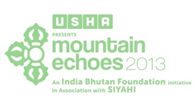Dr. Karma Phuntsho discussed his work with Pramod Kumar KG. He spoke about his chronicling of Bhutanese history in the book Reviews: History of Bhutan. He started mentioning how festivals like Mountain Echoes are crucial in increasing understanding between India and Bhutan and will help in continuing the friendship that the two nations share.
Dr. Phuntsho talked about Bhutanese history that he has chronicled and how he has done his best to stay unbiased in his book even though every person has their own baggage. He also talked of his work regarding the digitization of archives present at monasteries and even private homes. He talked of how there is more than one kind of knowledge that has been recorded in the monasteries and preserving it for the future is a responsibility.
Jerry Pinto and Sathya Saran spoke about the many lives of Jerry Pinto. Jerry had the entire audience engaged with the force of his words, as he talked about all the different kinds of work he has done – from his book on Helen to his book on Leela. “No book is worth hurting someone,” he said in answer to Sathya’s question about how he had to take some anecdotes out of his book. He also spoke of how the coming generation can only learn by emulation – if they see their parents read to relax, it is a habit that they too would inculcate.
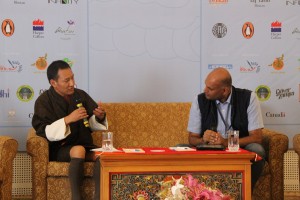
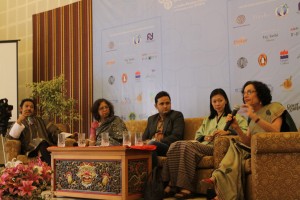
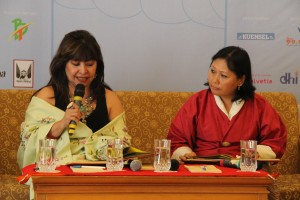
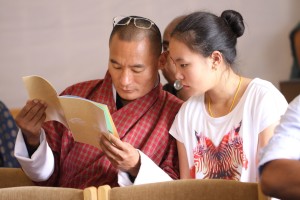
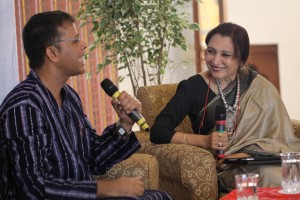
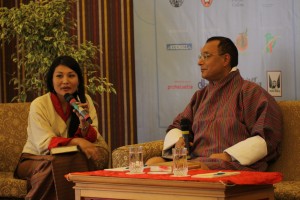
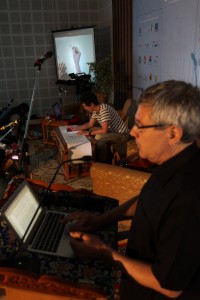
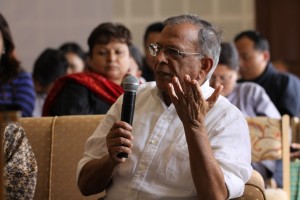 Jerry talked of his absolute love for translations and he was glad that Siyahi had done translation workshops. He mentioned how to gain another access to the world he learned Urdu and he learned Marathi as it is the language of his city, Mumbai. He read a passage from his latest book Em and the Big Hoom and concluded the sessions with the words “ If you feel the truth will hurt and not impact anyone, then make it a novel.”
Jerry talked of his absolute love for translations and he was glad that Siyahi had done translation workshops. He mentioned how to gain another access to the world he learned Urdu and he learned Marathi as it is the language of his city, Mumbai. He read a passage from his latest book Em and the Big Hoom and concluded the sessions with the words “ If you feel the truth will hurt and not impact anyone, then make it a novel.”
Lyonchen Tshering Tobgay launched the The Succesors of Zhabdrung Ngawang Namgyel – Hereditary Heirs and Reincarnations by Dr. Yoshiro Imaeda. The book is a condensed version of his PhD thesis in the English language talking about the history of Bhutan.
Ani Choying launched the book Mipham’s Dilectics and the Debates on Emptiness: To be, not to be or neither by Dr. Karma Phuntsho. An introduction to the Buddhist philosophy of Emptiness which explores a number of themes in connection with the concept of Emptiness, a highly technical but very central notion in Indo-Tibetan Buddhism. It examines the critique by the leading Nyingma school philosopher Mipham (1846-1912) formulated in his diverse writings.
Following the book launch, the two authors conversed about their work. Dr Imaeda and Dr. Phuntsho have both done similar work without ever knowing about the other, and together on the platform they promoted each other’s books. The conversation moved from history of Bhutan to the difference between Japanese and Bhutanese Buddhism. Dr. Imaeda spoke of there is a huge difference in Bhutanese and Japanese Buddhism where Bhutan has managed to keep their legacy alive and in practice. Dr. Imaeda spoke of how Mountain Echoes was an
Graphic artist Andrea Caprez started the session Speaking Graphics by performing a song that he had composed and the lyrics were by Christoph Schuler. A delightful presentation of whiteboard animation followed. Andrea drew and the view was visible on the screen while Christoph told the story behind those images in real time. The story started with their travelling in the Swiss Alps and the interesting things that they came across including cardboard farmhouses and waterfalls that were turned off at night. This was followed by a conversation about art, narration and the innovation that goes behind assimilating them with the two Swiss graphic artists in conversation with Amruta Patil.
Kezang Uden Penjor, Maria Rosa “Bing” N. Carrion, Chorten Tshering together with Jerry Pinto recited poetry. Bing’s work was varied, with the poems ranging from her care of the environment to her love for the Bhutanese culture. Kezang recited her poetry inspired from nature while Chorten Tshering recited poetry in Dzongkha which touched even the audience who did not speak the language. Jerry Pinto recited from the book Confronting Love. Inspired from the dais, a member of the audience recited a poem she had composed impromptu.
Lyonpo Om Pradhan conversed with Namgay Zam giving anecdotes illuminating recent history of Bhutan and the search for national identity. They discussed the book Bhutan- The Roar of the Thunder Dragon with Lyonpo emphasizing the importance of sovereignty in a nation. Giving examples of the monarchs of Bhutan, they reflected how time and again the country has chosen their freedom over economic development.
Siok Sian Dorji, Kunga Tenzin Dorji, Amish Tripathi, Ratnottama Sengupta conversed with Bachi Karkaria discussed social media movements and the role media does or does not play in creating and informing public opinion. In a frank conversation, the relevance of the newer forms of outreach and the newer formats of news presentation were discussed. The changes that have come over media have changed the role of the different forms – with print media concentrating more on the how and why while the social media concentrates on who, when and what. Siok Sian Dorji discussed Bhutanese media and the shift towards 24/7 news stations.
The fast paced media session was followed by Readings with Kelly Dorji and Dorji Dhradhul where the talented polymath and the “accidental author” read excerpts from their writings.
The last session of the day had Bachi Karkaria in conversation with Jane De Suza in a session which as per their promise was the opposite of intense and had the audience laughing the entire time. Bachi ended the session on limericks. The latter half of the session involved Ulap Leki doing standup comedy and he had the audience in splits despite the fact that he claims that he does not speak either Hindi or English. After the session, 10 year old, Penzi recited a poem she had written for her friend followed by Sadon reading ‘My love Song to India’.
The closing speech by Festival Director Pramod Kumar KG included the announcement that he along with Festival Director Namita Gokhale have made the decision to include two Bhutanese Festival Directors in Mountain Echoes 2014 – Kunzang Choden and Siok Sian Dorji (Pek). He spoke of how to give more representation to the regional languages, including Dzongkha and to include the population that does not speak English or Hindi, it was important to have Festival Directors who completely understood Bhutan.
The presenting sponsor of the festival USHA International feels that the last three days have been very intriguing, thought provoking and informative. Bhutan has provided a good platform for the company’s belief of bringing progress to remote areas through the Silai School venture.

